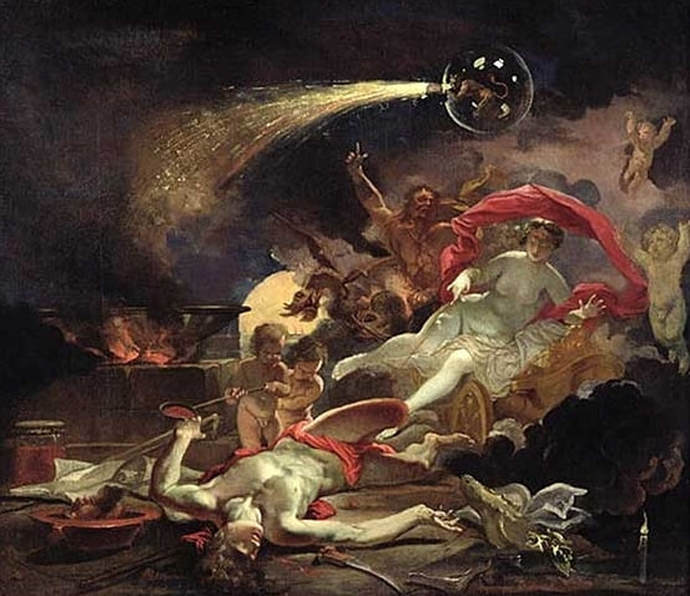AESON IN GREEK MYTHOLOGY
Aeson was a mortal prince of Greek mythology, the heir to the throne of Iolcus, and most famously, the father of the Greek hero Jason.
Aeson son of Cretheus
Aeson was the son of Cretheus, the son of Aeolus who had founded the city of Iolcus, and Cretheus’ wife Tyro, the daughter of King Salmoneus.
Aeson would have two brothers Pheres and Amythaon, and also two stepbrothers, Neleus and Pelias, born to a brief relationship between Tyro and the god Poseidon.
Aeson would have two brothers Pheres and Amythaon, and also two stepbrothers, Neleus and Pelias, born to a brief relationship between Tyro and the god Poseidon.
Aeson Usurped
|
Aeson was to be the successor of Cretheus, but when Cretheus died, Pelias took the throne of Iolcus, sending Pheres, Amythaon and Neleus into exile. Pheres would go to Thessaly, and found the city of Pheres, Amythaon would go to live in Pylos, and Neleus would go to Messenia, Aeson though was not sent into exile, and instead Pelias imprisoned Aeson to prevent future threats to his rule.
|
|
Aeson Father of Jason
By this time Aeson was wed, although the wife of Aeson changes between ancient sources, for the wife of Aeson is variously named as Alcimede, Amphinome, Arne, Polymede, Polymele, Polypheme and Scarphe, although Polymede and Alcimede are the most commonly named; Polymede being the daughter of Autolycus, and Alcimede the daughter of Clymene.
The wife of Aeson would give birth to a son, but fearful for his life if Pelias knew a heir to Aeson had been born, it was proclaimed that the son of Aeson had died during childbirth. Of course the son was alive, but he was secretly placed in the care of the wise centaur Chiron, for this son of Aeson was Jason.
Aeson and his wife would spend many years imprisoned within the palace of Iolcus, and during this time Aeson would become father to a second son, Promachus.
The wife of Aeson would give birth to a son, but fearful for his life if Pelias knew a heir to Aeson had been born, it was proclaimed that the son of Aeson had died during childbirth. Of course the son was alive, but he was secretly placed in the care of the wise centaur Chiron, for this son of Aeson was Jason.
Aeson and his wife would spend many years imprisoned within the palace of Iolcus, and during this time Aeson would become father to a second son, Promachus.
The Death of Aeson
|
Despite having his main rival Aeson imprisoned, Pelias was far from secure in his rule, and indeed a prophecy warned him of a threat from a man with one sandal. Of course such a man turned up, and this man was the grown up son of Aeson, Jason.
Pelias would seek to get rid of Jason by sending him on a seemingly impossible quest to retrieve the Golden Fleece from Colchis, but the story of Aeson now diverges on different paths depending upon different sources. Some tell of how Pelias decided now to kill Aeson, Aeson’s wife and son Promachus to prevent future threats to his rule, and so perhaps Pelias killed all three. Alternatively, Pelias might have induced all three to commit suicide by telling them that Jason and the Argonauts had perished in their quest; the method of suicide being either through the drinking of ox’s blood or via hanging. The Rejuvenation of AesonA third story of Aeson though tells not of his death in Pelias’ prison, for some tell of Aeson being alive when Jason returned to Iolcus. In this version of the Aeson tale, Jason asks Medea to rejuvenate his elderly father something she does.
The rejuvenation of Aeson would lead the daughters of Pelias to request the same for their father, but in the case of Pelias, Medea does not resurrect him after the daughters slit his throat. |
|
If Aeson is made young again though, nothing is told of him after the departure of Jason from Iolcus, for Acastus, son of Pelias succeeded to the throne.
|
|
